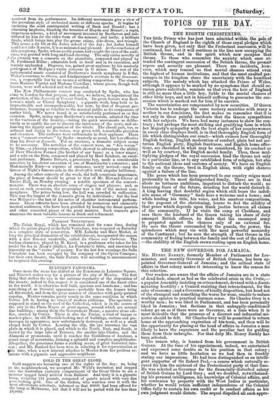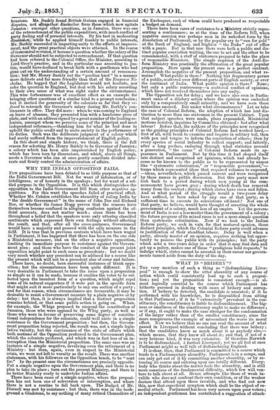THE NEW GOVERNOR FOR JAMAICA.
Mn. HENRY BAMELY, formerly Member of Parliament for Leo- minster, and recently Governor of British Guiana, has been ap- pointed Governor-General of Jamaica; and the critical state of affairs in that colony makes it interesting to know the reason for this selection.
Our readers are aware that the affairs of Jamaica are in a state of dead-lock, almost as bad as the celebrated crisis in the Critic,‚ÄĒ a popular Assembly insisting on retrenchment, devised with a discri- minating hostility ; a Council resisting that retrenchment, for the sake of economy ; and a Governor, of kindly disposition, but head not of the strongest and something the worse for wear, unable to reduce working opinion to practical common sense. Sir Charles Grey is a worthy man ; he was liked in Parliament, and has been personally liked in Jamaica ; but factions in that unhappily-conditioned colony go on as if there were no Governor, at a time when it is most desirable that the presence of a discreet and influential mi- nister should be felt. Sir Charles Grey will be permitted to return home at the approaching expiration of his term, and then will be the opportunity for placing at the head of affairs in Jamaica a man likely to have the experience and the peculiar tact for guiding them from their imbroglio. For that duty Mr. Henry Barkly has been selected.
The reason why, is learned from his government in British Guiana. At the time of his appointment, indeed, we entertained and expressed some doubts as to his position in that colony ; and we have as little hesitation as we had then in frankly stating our impressions. He had been distinguished as an intelli- gent supporter of Sir Robert Peel,‚ÄĒa course which naturally se- cured for him the mistrust of the Protectionist party at that time. He was selected as Governor for the financially-disturbed colony of British Guiana by Lord Grey ; and we doubted, notwithstand- ing his personal intelligence, his knowledge of Colonial affairs, and his connexion by property with the West Indies in particular, whether he would retain sufficient independence of the Colonial Office fully to sustain his own credit or to conduct affairs as his own judgment would dictate. The sequel dispelled all such appre-
disputes, no *eget eri frbm those .which now agitate
Jamaica : amongst other queations, as in Jamaica, there was one of the retrenchment of the public expenditure, with much conflict of party feeling and of personal interests. By his tact in moderating distientioilwhile he applied himself frankly to public interests, Mr :ar3tly suceeeded in impartin,,
m unity to the efforts at improve-
ent; iand the great'praetical objects were attained. In the course of ecinonnical revision, it became a question whether the salary of the Governorshould not be subjected to retrenchment. If that question had been referred to the Colonial Office, the Minister, according to Lc;rd Grey's practice, and in the particular case according to jus- tice, would have declined to break faith with a gentleman who had gone out, on the understanding of a certain amount of remunera- tion : but Mr: Henry Barkly cut the " gordian knot" in a manner more delicate and'far more friendly than that of the Emperor Ni- cholas. He begged that the Legislature would not hesitate, nor refer the, question to England, but deal with his salary according to their 'own sense of what was right under the circumstances. This wise forbearance was of excellent effect as an example for bringing other questions of a similar kind to a prompt conclusion; but it incited the generosity of the colonists so far that they re- fried to retrench the Governor's salary during Mr. Barkly's con- tinuance in office. They did more : when he was coming to England on leave of absence, they presented him with a handsome piece of plate, and with an address signed by a great number of the leading co- lonists, amongst whom we perceive some of the principal and most independent reformers,‚ÄĒthanking him foi'What he had done to uphold the public credit and to unite society in the performance of its duties. Such was the deliberate judgment of a colony which had sorely suffered from the impoverishment of English policy. In this short and simple history, we think, there is the full reason for selecting Mr. -Henry Barkly to be Governor of Jamaica; a colony which has been also impoverished by English policy, which has been torn by dissensions, and which, above all things, needs a Governor who can at once gently conciliate divided inte- rests and firmly control the administration of affairs.



























 Previous page
Previous page